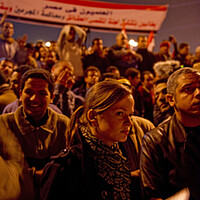In Croatia, migrants find themselves in an information blackout
Loading...
| Tovarnik, Croatia
Yazan has been waiting for two days at the train station in this small town just across the border from Serbia, along with thousands of other refugees and migrants making their way to northern Europe.
In the punishing heat, people crowd under every sliver of shade. Many people’s clothes are crusted in sweat; the smell of the portable toilets wafts over the crowds. The dusty yard around the station is full of listless, exhausted people, waiting for a train that never seems to show up.
But, more crucial for the road ahead, there is no place to charge a mobile phone and no vendors selling local SIM cards for Internet access. Police won’t let the refugees leave the station and head into the town to buy them. That means Yazan is unable to access what he is most desperate for right now – information.
Are Slovenian police stopping refugees who try to head into that country from Croatia? If he boards the trains or buses provided by authorities, will the Croatian authorities make him apply for asylum in their country, or put him on a bus to Hungary? Where are the smugglers and taxi drivers ubiquitous in the other countries he has traveled through, who charge high prices to drive refugees to their next border crossing?
The lack of answers is posing a new obstacle for Yazan, who declined to give his last name because his family still lives in Islamic State-controlled Mosul, and his fellow migrants, who began trickling into Croatia Wednesday after Hungary sealed off its border.
In the dark
Croatia is becoming a new pathway for the migrants hoping to reach Austria, Germany, and beyond – in the last three days, more than 17,000 have arrived in the country. But the economic and information network that built up over the migrant path from Turkey to Hungary has not yet caught up on the new trail.
The well-worn route, via Greece, Macedonia, Serbia, and Hungary, saw a flourishing economy spring up around it – stores that sell life jackets for the sea crossing; taxis that drive refugees to or from border crossings; smugglers; vendors selling SIM cards and phone credit. And the thousands that trod it passed on information about where to go and what smuggler to call to those coming behind them.
But here, the asylum seekers are flying blind, trying to make the best decisions about how to continue their journeys without information or resources. Increasing confusion, the Croatian government has reversed course twice in three days on its plans for dealing with the flow of people, and rumors about what Croatia will do with the refugees fly around the station like wildfire.
Now Yazan, a young, blue-eyed Iraqi, is taking his chances. He’s finally near the front of a queue for the buses provided by authorities, so he has decided to go, even though he’s unsure of where it’s headed. Croatia today sent more than 1,000 refugees on buses to Hungary, a place most refugees are desperate to avoid.
Sweat rolled down his face as he stood in the sun to keep his place in the line. He said police told him the bus would take him to a camp where they would wait to see what would happen on the Slovenian border. “We don’t know anything now. We just have to wait,” he said. “We are the first people going this way, so we are worried. But we can’t go back again, so we just have to find a new way forward.”
'Now we're stuck here'
Others are looking for other options. Mamdouh, like many others, is seeking a taxi driver or smuggler who could drive him to the Slovenian border. But no one around the station knows of any such drivers. The young Syrian could search for contacts online, but his mobile phone is nearly dead, and he doesn’t have Internet access at the station.
Now he’s considering crossing back into Serbia, where he can charge his phone, receive money through a wire payment from his family in Damascus, and work on finding a smuggler to drive him to Slovenia. “I thought Turkey was the most difficult step, but now we’re stuck here,” he says.
After they get that far, both Yazan and Mamdouh plan to attempt to cross the Slovenian border undetected if police are not allowing refugees to pass. But they don’t yet know the optimal places to slip into the country.
Still others have tried their luck on foot, walking north. Yesterday, when frustrated refugees tired of waiting broke through police lines, many scattered into fields to set off on foot.
Qamar Hussain, from Pakistan, slipped away from the train station this morning, and says he hiked for three hours before police caught up with him and brought him back to the station. Now he sits on the train tracks, hoping to have optimal position when the next train arrives.
“So now, we wait,” he says. “What can we do? Nothing.”








